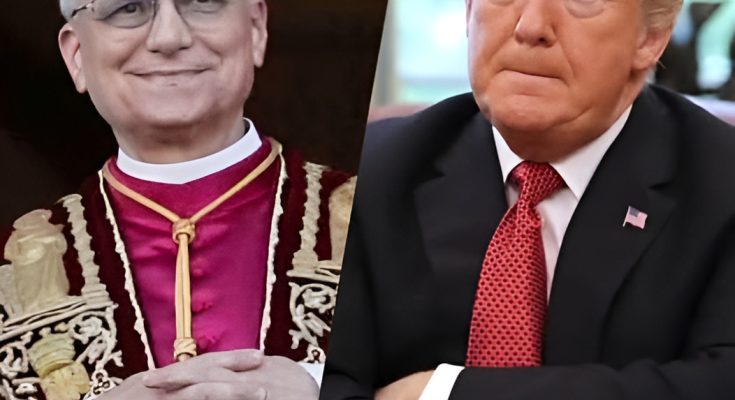Pope Leo XIV, formerly known as Cardinal Robert Prevost, has consistently voiced his beliefs on immigration, social justice, and the moral responsibilities of nations toward people in need. His approach is rooted in decades of theological study, pastoral experience, and a profound commitment to humanitarian principles. From his earliest days as a cardinal, Prevost demonstrated an unwavering concern for the vulnerable, emphasizing that society’s treatment of immigrants, refugees, and marginalized individuals reflects its moral integrity. Since ascending to the papacy, he has maintained a clear, firm stance on the importance of compassion, inclusion, and the recognition of every human being’s inherent dignity.
The Pope’s perspective is firmly anchored in Catholic social teaching, which calls for a preferential option for the poor, the protection of human life, and a commitment to solidarity across borders. These principles often put him at odds with political figures in the United States, including Vice President JD Vance and former President Donald Trump, both of whom have advocated for restrictive immigration policies that Pope Leo XIV finds morally problematic.
JD Vance’s Controversial Statements on Immigration
Earlier in 2025, JD Vance delivered a public speech in which he used the Latin phrase ordo amoris, or “order of love,” to explain his philosophy on social priorities. According to Vance, citizens should prioritize their own families, local communities, and fellow countrymen before extending help to outsiders such as immigrants or refugees. He framed this hierarchy of love as a pragmatic necessity for societal stability and national cohesion, arguing that governments should focus on citizens first and foremost.
While some of Vance’s supporters praised the speech as a realistic acknowledgment of the limits of social resources, Pope Leo XIV and his advisers reacted with concern. The pope believes that love and moral responsibility cannot be compartmentalized or limited to one’s immediate social circle. The teachings of the Church, as emphasized by both Pope Leo XIV and his predecessor Pope Francis, stress that moral duties extend to all human beings, regardless of nationality, ethnicity, or immigration status.
In response to Vance’s speech, Pope Leo XIV reportedly shared several articles and posts on social media that challenged the idea that compassion can—or should—be restricted. One post, according to The Daily Beast, emphasized that love and justice are not zero-sum games. By insisting that governments and individuals alike must care for strangers and the marginalized, Pope Leo XIV reaffirmed a core tenet of Catholic teaching: that society’s moral health is measured by how it treats the least privileged.
The pope’s perspective reflects decades of Church doctrine, including encyclicals such as Caritas in Veritate and Evangelii Gaudium, which call for inclusive economic policies, protection for migrants, and advocacy for those living in poverty. For Pope Leo XIV, the moral argument is straightforward: turning away or limiting help to those in desperate need is inconsistent with the Gospel and the universal call to love one’s neighbor.
Criticism of Trump’s Immigration Policies
Pope Leo XIV’s concerns about U.S. immigration policy predate his papacy. As Cardinal Prevost, he frequently spoke out against measures implemented during the Trump administration, including family separations at the border, restrictions on asylum seekers, and policies that made it more difficult for refugees to find safe harbor.
The pope’s objections are not merely political; they are deeply ethical and grounded in Catholic theology. He has highlighted that every human life possesses inherent dignity, and that policies creating barriers to safety, food, and shelter undermine the moral fabric of society. Pope Leo XIV has repeatedly called for compassion in the treatment of migrants, asserting that governments should adopt humane, just, and fair practices while balancing national security and social welfare.
During his time as a cardinal, he met with immigrant families, visited detention centers, and studied the social consequences of restrictive policies. These experiences profoundly shaped his views and reinforced his belief that ethical governance requires prioritizing human dignity over political expediency.
The Pope’s Broader Immigration Philosophy
Pope Leo XIV’s approach to immigration is comprehensive. He emphasizes not only the moral obligations of governments but also the responsibilities of individuals, communities, and religious institutions. According to his vision, welcoming immigrants is an act of moral courage that strengthens societies spiritually, socially, and economically. He often points to historical examples where countries benefitted from embracing newcomers rather than excluding them.
The pope also encourages dialogue across faiths, ethnicities, and political affiliations to foster understanding and cooperation. He believes that fear and prejudice often drive restrictive policies, and that education, compassion, and exposure to different cultures can counteract these tendencies. By advocating for empathy and shared humanity, Pope Leo XIV seeks to create a more just world in which the treatment of immigrants reflects universal ethical standards rather than short-term political calculations.
Responses from Political Figures and Communities
Pope Leo XIV’s views have sparked discussion across political and religious landscapes. Supporters of JD Vance and former President Trump have criticized the pope’s statements as overly idealistic, arguing that nations must prioritize citizens’ needs before extending help abroad. These critics claim that unrestricted immigration can strain public services, create security concerns, and disrupt social cohesion.
However, many religious leaders, human rights advocates, and international organizations have applauded Pope Leo XIV for maintaining a consistent ethical stance. They argue that moral leadership is essential in times of political division and that the Church’s voice can remind policymakers of their obligations to uphold human dignity.
Communities worldwide have also reacted to the pope’s statements. In areas with large immigrant populations, parishioners and local leaders have cited Pope Leo XIV’s teachings as inspiration for inclusive programs, community centers, and social services that support newcomers. By framing immigration as a moral imperative rather than merely a political issue, the pope has mobilized people across continents to consider more compassionate and equitable approaches.
Faith, Policy, and Global Implications
The pope’s stance underscores the intersection of faith, policy, and global ethics. In an era of rising nationalism, political polarization, and heated debates over borders, Pope Leo XIV reminds the world that moral principles transcend political agendas. His insistence that love and justice should guide decisions about immigration challenges leaders to consider not just economic or security concerns but also ethical responsibilities.
Moreover, his teachings resonate beyond the United States. Across Europe, Latin America, Africa, and Asia, millions of people face displacement due to conflict, climate change, and economic hardship. Pope Leo XIV’s emphasis on inclusivity, empathy, and international solidarity highlights the need for global cooperation to protect vulnerable populations.
A Legacy of Moral Leadership
Pope Leo XIV’s approach to immigration is consistent with the broader vision of the Catholic Church, which has long advocated for social justice, humanitarian aid, and protection for the oppressed. By taking a clear stand against policies that limit or exclude immigrants, he demonstrates moral courage in the public sphere. His leadership challenges politicians, communities, and individuals alike to consider the ethical implications of their actions and to prioritize compassion over convenience or prejudice.
In addition to his public statements, Pope Leo XIV has also encouraged scholarly research, interfaith dialogue, and community-based initiatives to address the root causes of migration, including poverty, violence, and environmental degradation. By fostering a holistic understanding of immigration, the pope seeks not only to influence policy but also to cultivate a culture of empathy and moral responsibility.
Conclusion: A Call for Compassion
In a world where debates over immigration are often divisive and polarized, Pope Leo XIV offers a compelling moral framework grounded in faith, ethics, and human dignity. His opposition to JD Vance’s “ordo amoris” approach and to restrictive policies championed by former President Trump reflects a consistent belief that love, compassion, and justice should guide societal decisions.
By emphasizing the universal value of every human life, the pope challenges both leaders and citizens to reimagine their responsibilities to others. Whether through advocacy, social programs, or simple acts of kindness, Pope Leo XIV encourages individuals to participate in creating a more inclusive and humane world.
Through his teachings, public statements, and pastoral work, Pope Leo XIV has become a moral compass on the issue of immigration, reminding the global community that ethical leadership is about more than politics—it is about embracing the shared humanity that unites us all.



